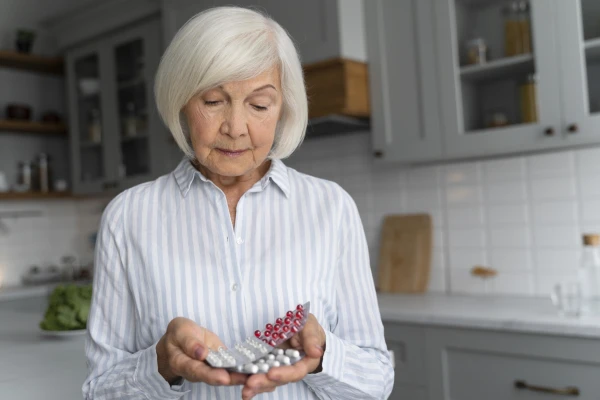
When we feel unwell, we first reach for the medicine cabinet. It usually contains a basic set of medications that we take without even thinking about how they interact with each other. Cardiologist Valentina Baidina explained which medications are categorically incompatible.
Many people take various medications without consulting a doctor and even without reading the instructions. However, some tablets, powders, solutions, and capsules that we use to treat headaches, colds, coughs, or allergies can seriously conflict with medications prescribed for the treatment of various chronic conditions. As a result, one can end up with a volatile mixture — a dangerous combination that will cause side effects and provoke complications.
Here is what you must know before taking a pill.
Dangerous Combinations of Medications
"It is true that many medications are incompatible. This is usually mentioned in the medication's instructions," said cardiologist Valentina Baidina to “Doctor Peter.” "Therefore, if it is necessary to take an additional medication alongside the basic therapy for hypertension, coronary heart disease, or another chronic condition, it should be clarified with a doctor or at least in the instructions."
The doctor explains: the problem is not that the medication may not work. It is much more dangerous. Some combinations of medications can threaten health and even life.
Allergy and Cough Medications
If a person suffers from seasonal or persistent allergies, they may be prescribed antihistamines. When a cold arises against the backdrop of allergies, accompanied by a runny nose and cough, many use various syrups or cough tablets without considering that this is dangerous. Moreover, many over-the-counter cough and allergy medications may contain similar active ingredients.
The simultaneous intake of two or more medications with similar effects can lead to the accumulation of toxic levels of the drugs.
Sedative effects may sharply increase, which is dangerous for drivers and people who need maximum concentration. Additionally, such combinations can lead to appetite and sleep disturbances, severe lethargy, and sluggishness.
Antidepressants and Painkillers
Patients with depression often experience pain in different parts of the body, which arises under the influence of external factors. Often, to alleviate this pain, over-the-counter painkillers are used, which are not recommended alongside antidepressants.
Thus, against the backdrop of taking SSRIs (selective serotonin reuptake inhibitors), the use of NSAIDs (non-steroidal anti-inflammatory drugs), which provide antipyretic and analgesic effects, can lead to complications. These include bleeding from the esophagus or stomach walls. The simultaneous intake of these medications increases the risks by 7 times or more.
Aspirin and Anticoagulants
Many patients are prescribed anticoagulants to prevent or treat vascular thrombosis. However, during an acute respiratory infection, when experiencing headaches or elevated temperatures, many of us traditionally reach for aspirin.
But few know that this medication, in addition to its primary effect, also has an antiplatelet effect, meaning it significantly thins the blood and reduces its clotting ability. This can provoke life-threatening bleeding — either external or internal.
MAO Inhibitors and Cold Medications
Medications from the monoamine oxidase inhibitors (MAO) group may be prescribed for the treatment of depression, Parkinson's disease, and certain other conditions.
If patients with such conditions catch a cold and use nasal sprays or drops with vasoconstrictive action, or take medications containing caffeine, aspirin, or paracetamol, they may provoke a serious hypertensive crisis, which is extremely difficult to manage and can threaten the person's life due to complications.
Heart Medications and Other Disease Treatments
In the context of certain heart conditions, doctors use medications from the cardiac glycoside group. If diuretics are used alongside these medications, it can lead to life-threatening arrhythmias. The combination of furosemide and digoxin is particularly dangerous, especially against the backdrop of developing edema and high blood pressure. This combination leads to potassium loss through urine, while the level of digoxin increases, forming toxic concentrations.
Patients with heart conditions are also at risk when taking Viagra analogs, which can provoke a hypertensive crisis. If nitrates (nitroglycerin) are additionally used alongside this medication, health risks increase significantly. Heart failure and death may occur.
Blood Pressure Medications and Antibiotics
When treating hypertension, doctors may prescribe medications from the ACE inhibitors group or medications from the angiotensin II receptor blockers group (ARBs). During their use, it is prohibited to take antibiotics from the trimethoprim and sulfamethoxazole group (co-trimoxazole, Biseptol). There is evidence of the dangers of combining blood pressure medications with erythromycin and macrolide antibiotics. Possible issues include digestive problems, increased blood pressure, and a risk of stroke.













